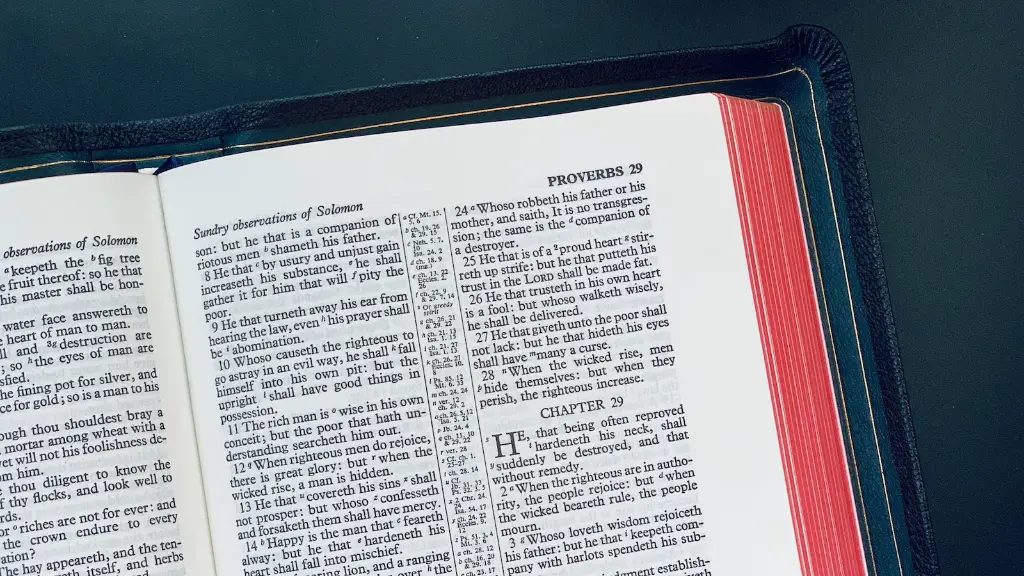The Word of Angels in the Bible
Angels are one of the most powerful beings in the Bible and have a significant presence throughout its pages. In various stories, they are used as tools to bring justice, protection, and mercy to humans. But how do they actually look?
The Bible doesn’t provide any definitive answer as to what these angels’ true physical form is like. The descriptions provided by Scripture typically only cover their light and clothing—not their facial features or anatomy. It is clear, however, that angels have human-like features in some sense.
In Hebrews 13:2, it says “Do not neglect to show hospitality to strangers, for thereby some have entertained angels unawares.” This passage implies there is a form of invisibility that is particularly true of angels. The idea that an angel can show up looking like a human is further supported by other passages such as when the angel Gabriel showed up to Mary prior to the birth of Jesus. He was described as looking like a man.
An interesting point to note is that some of the more famous angels in the Bible, such as Gabriel and Michael, are never actually described in terms of what they look like. Another example is the angel of death in the Old Testament who appears to people but never has a face revealed to them. This could be interpreted as a sign that the Bible doesn’t want us to focus on the physical image of the angels themselves, but rather to their purpose and spiritual power.
The Bible also states that angels can appear in many different forms. In the book of Revelation, an angel appears with a fiery face, while another appears in the furnace with three men. This suggests that different angels may have different interpretations or purposes and as a result, they also have different physical forms.
In summary, the Bible does not provide a clear answer as to how angels look. It does, however, provide some clues. Angels are able to appear as humans, but they may also take on different forms. It is possible that the lack of specific descriptions of angels in the Bible is deliberate, in order to emphasize their spiritual power and purpose rather than their physical form.
Angels’ Role and Meaning
Angels play an important role in the Bible, far beyond their appearances. They are often used to carry out God’s will, such as in the story of Gideon in Judges 6. Many times throughout the Bible, angels are present to warn, protect, or bring news of God’s plan. Furthermore, angels have their own language, laws, and hierarchy within the spiritual realm.
Angels can also represent other beings or creatures in the Bible. They can be seen as messengers from God, or signs of his power and presence. In other instances, angels can represent the spiritual world, such as in the story of the great battle in Heaven in Revelation 12, where Michael and his angels battle Satan and his angels.
Angels play an important role in the theology of Christianity. In many beliefs, they are seen as intermediaries between God and humans. They have the authority and power to influence the course of events on Earth, but also act as reminders of God’s divine presence.
In summary, angels are vital figures in the Bible. Their importance lies far beyond their physical form. Angels represent divine power, God’s will, and his presence in our lives. They are reminders of God’s presence and his love for his people.
History and Popular Culture Of Angels
Humans have been fascinated by angels for centuries. Angels have been depicted in artwork and literature throughout human history. In some cases, angels have become popular figures in popular culture and mythology. For instance, angels are often seen as benevolent, guardian figures in many cultures.
In many of these stories and images, angels are typically depicted with wings, a flowing white robe, and a halo around their heads. This image of angel is a popular one that has been adapted from ancient images and artwork of angels from centuries past. In more modern times, more creative interpretations of angels have surfaced.
In recent years, angels have become popular characters in books, films, and television shows. This trend has been particularly noticeable in fantasy stories and comics, where angels are often given supernatural powers. Angels are typically portrayed as figures with great power who can help people in need and protect them from harm.
In summary, angels have been a source of fascination for humans for centuries. From ancient artwork to modern films, the image of angels has changed over time. However, their importance to religious stories and cultures remains. Angels are not just figures of beauty and protection, but reminders of God’s divine power in our lives.
Interpretations of Angels
Angels have been an area of great debate for centuries, as each religion has its own interpretation. For instance, in Islam, angels are typically seen as protectors and messengers of Allah, while in Judaism angels serve as messengers of God. In Christianity, many people view angels as divine messengers and representatives of God.
Theologians and religious scholars have long debated the role and purpose of angels in the Bible. While some believe that angels are mere symbols of divine power and influence, others have argued that they have a literal presence, serving as agents in God’s divine plans.
However, despite their various interpretations, one thing remains clear: in the Bible, angels are generally seen as heavenly messengers and representatives of God, with a deep understanding of his will and plans. Therefore, their roles and purposes are much greater than mere symbols or tools of divine power.
In summary, angels have been debated for centuries and have various interpretations in different religions. However, in the Bible, they are typically seen as divine messengers and representatives of God, with a great understanding of his will and plans.
Angels’ Impact On Faith
Angels can be seen as powerful symbols of faith and hope in the Bible. In many passages, they are described as messengers sent from Heaven with a divine purpose. This can be seen in the story of the Angel Gabriel appearing to Mary, for example. In addition, angels often appear as protectors or warriors of God, as seen in many Old Testament battles.
For many believers, angels symbolize the power and presence of God in their lives. They are reminders that God is always with us and that his divine power and love is always at work. In difficult times, angels can act as a source of strength and hope to believers.
For non-believers, angels can be seen as a symbol of human kindness and compassion. They can remind us to act with mercy and offer help to those in need. In addition, angels remind us that no matter how difficult the situation, there is always hope and light at the end of the tunnel.
In summary, angels can have a profound impact on faith and life, regardless of one’s beliefs. They can be seen as powerful symbols of faith and hope, offering encouragement and protection in difficult times. Furthermore, they remind us to act with mercy and compassion and to always strive to do the right thing.
Angels In Everyday Life
Angels play an important role in many people’s lives and beliefs. Many people believe that angels are constantly surrounding them, providing protection and guidance in their lives. In this way, they become a source of comfort and strength to believers in difficult times.
In addition, some people believe that angels can play a part in more mundane activities. For instance, some people believe that angels can be called on to help when making decisions or to help with specific tasks. Furthermore, angels are believed to be messengers of God, who can provide insight into his plans for individuals.
In summary, angels play an important role in many people’s lives. They offer comfort and strength in difficult times, as well as being called upon to help with everyday tasks. Furthermore, they offer insight into God’s plans for individuals, serving as messengers from Heaven.





